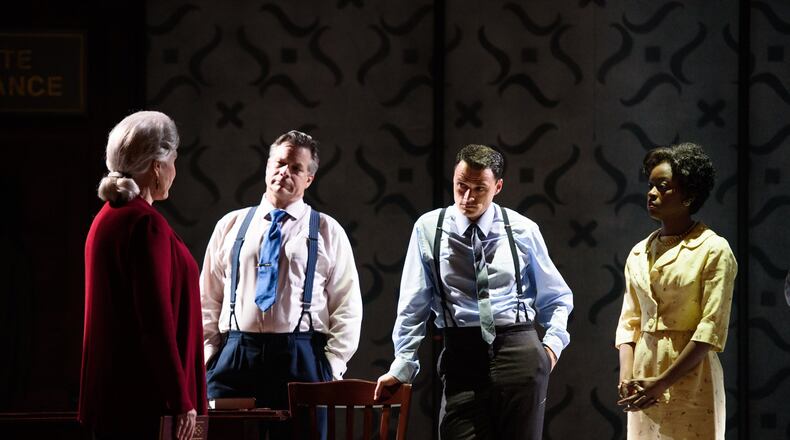On Oct. 12, 1958, Atlanta awoke to discover a rip in its soul.
As Melissa Fay Greene describes in the prologue of her brilliant, magisterial 1996 history, “The Temple Bombing,” “Fifty sticks of dynamite in the middle of the night blew apart the side wall of the Temple, Atlanta’s oldest and richest synagogue, which stood in pillared, domed majesty on a grassy hill above Peachtree Street.”
No lives were lost in this act of terrorism. But great damage was done, in the form of fear and horror.
Atlanta’s Jewry had not healed from the 1915 lynching of Leo Frank. Now, stoked by the 1954 Supreme Court decision declaring the segregation of public schools unconstitutional, a new kind of hate was raging: White supremacists were going after blacks by attacking their Jewish brethren. This made Jacob M. Rothschild, the Temple’s blunt, outspoken chief rabbi, a prime target.
Apparently, “the city too busy to hate” was slithering with serpents.
These events, and the courtroom shenanigans that occurred after five men were accused but never convicted of the crime, are the subject of "The Temple Bombing," an Alliance Theatre world premiere written and directed by Jimmy Maize. A member of New York's Tectonic Theater Project, which developed the play in association with The Temple, Maize was inspired by Greene's book. But he also did a fair amount of his own research.
Given the mood of our own time, amid a wave of anti-Semitism, “The Temple Bombing” is not only a kaddish for Frank and a tribute to the moral courage of Rothschild and his flock: It is a call to action. It is required that we see it, and remember.
Which is not to say it is perfect.
In 1 hour, 40 minutes, 10 actors play more than 100 characters. Without regard to race or gender, they slip in and out of costumes, dialects, scenes, time periods. Tectonic’s ensemble-driven, documentary-style of storytelling, made famous by “The Laramie Project” (2000), is a theatrical device that now feels a bit labored. Here, the comedy of having, say, a black man play a Jewish matriarch often goes unexploited, while the zigzaggy re-ordering and repeating of chronological events can make the piece feel unnecessarily fragmented.
But even as Ralph McGill knocks out his Atlanta Constitution columns and Aline Uhry (mother of future playwright Alfred) expresses her indignation — actor Amari Cheatom plays both roles, among others — an essential crucible emerges from the rubble: Rothschild (Todd Weeks); his wife, Janice (Caitlin O’Connell); and George Bright (Eric Mendenhall), the man who was tried twice but never convicted. (Charges against four other suspects were eventually dropped, the crime never solved.)
Weeks, for me, doesn’t quite project the leonine charisma that was Rothschild. That leaves O’Connell to articulate the menacing nature of the threats on the her family, the withering cross-examinations in the courtroom by slick lawyer Reuben Garland (Ric Reitz), and so on.
Wonderfully portrayed by O’Connell, the elegant rabbi’s wife becomes the voice of the drama, narrating and setting up scenes. While she could have wilted in the spotlight and played the victim, she is a strong feminist role model and the play’s linchpin. (Rabbi Rothschild died in 1973, but his wife survives, and it was moving to see her in the audience Tuesday night, when Temple congregants arrived en masse to see the work they envisioned to mark their 150th anniversary.)
This universally strong cast also includes Minka Wiltz (an African-American woman who gets to play a white male judge); Lee Osorio (who evokes Frank delicately and poignantly); Danielle Deadwyler; Ann Marie Gideon; and Justin Walker.
As always, the Alliance assembles a top-notch design team. Meredith Ries’ sets, Sydney Roberts’ costumes, Jake DeGroot’s lighting, Kendall Simpson’s sound design and original music, and David Bengali’s projections evoke a time of segregated bathrooms, screaming headlines and epochal change. A visual knockout.
Still, “The Temple Bombing” isn’t likely to go down as a signal moment in Atlanta theater, nor to sit alongside the works of Uhry, Pearl Cleage and Janece Shaffer. But it is a story, by turns sad and uplifting, gritty and eloquent, that speaks to who we are as a city, and a nation, today.
The similarities between 1958 and 2017 are too obvious to be dismissed. The bombing of architect Philip Trammell Shutze’s beautiful 1931 temple was not fake news. But out of that darkness, a path of healing and forgiveness was illumined. That’s what makes this play so unsettling — and so significant.
Theater review
“The Temple Bombing”
Grade: B-
7:30 p.m. Tuesdays-Thursdays. 8 p.m. Fridays-Saturdays. 2:30 p.m. Saturdays-Sundays. 7:30 Sundays. Through March 12. $20-$65. Alliance Theatre, 1280 Peachtree St. N.E., Atlanta. 404-733-5000, alliancetheatre.org
Bottom line: Remembering a dark moment in Atlanta history
About the Author
Keep Reading
The Latest
Featured


